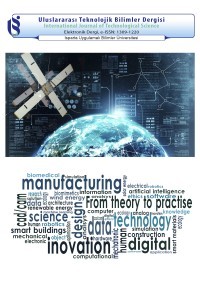Comparative analysis of the performance and exergy efficiency of absorption cooling system for different working fluids
Bu çalışmada, termodinamiğin birinci ve ikinci kanunları, tek etkili absorpsiyonlu soğutma sisteminin enerji ve ekzerjik verimliliğini değerlendirmek için kullanılmıştır. Absorpsiyonlu soğutma sisteminde çalışma sıvısı olarak LiBrH2O, LiSSC ve LiCl-H2O kullanılmıştır. Farklı çalışma akışkanları için çeşitli çalışma koşullarında enerji, ekzerjetik verimlilik ve sirkülasyon oranı değerleri incelenmiştir. Sonuçlar, LiCl-H2O solüsyonlu absorpsiyonlu soğutma sisteminin farklı çalışma sıcaklıkları için en yüksek COP ve ekzerjik verimlilik değerine sahip olduğunu gösterdi. Ayrıca her bir sistem bileşeninin tersinmezlik değerleri hesaplanmıştır. Sonuçlar, jeneratörde ve soğurucuda maksimum tersinmezliğin oluştuğunu gösterdi. Tüm analizlerde EES programı kullanılmıştır. Bu çalışmadan elde edilen sonuçlar absorpsiyonlu soğutma sisteminin optimizasyonu ve optimum çalışma koşullarının elde edilmesi için kullanılabilir.
Anahtar Kelimeler:
Absorpsiyonlu soğutma, Enerji Analizi, Ekserji Analizi, Tersinmezlik, Çalışma Akışkanları
Comparative analysis of the performance and exergy efficiency of absorption cooling system for different working fluids
In this study, the first and second laws of thermodynamics have been employed to evaluate energy and exergetic efficiency of the single effect absorption cooling system. LiBrH2O, LiSSC and LiCl-H2O were used as working fluid in the absorption cooling system. The energy, exergetic efficiency and circulation ratio values at various operating conditions for different working fluids were investigated. The results showed the absorption cooling system with LiCl-H2O solution has the highest COP and exergetic efficiency value for different operating temperatures. In addition, the irreversibility values of each system component were calculated. The results showed that maximum irreversibility was occurred in the generator and absorber. EES program was used in all analyzes. Obtained results from this study can be used for optimization of absorption cooling system and obtaining optimum operating conditions.
___
- Kaushik SC, Arora, A. Energy and exergy analysis of single effect and series flow double effect water–lithium bromide absorption refrigeration systems. International Journal of Refrigeration., 32(6), 1247-1258, 2009.
- Arora A, Kaushik, SC. Theoretical analysis of LiBr/H2O absorption refrigeration systems. International Journal of Energy Research., 33, 1321-1340, 2009.
- Kaynakli O, Saka K, Kaynakli F. Energy and exergy analysis of a double effect absorption refrigeration system based on different heat sources. Energy Conversion and Management., 106, 21-30, 2015.
- Aman J, Ting DK, Henshaw P. Residential solar air conditioning: Energy and Exergy analyses of an ammonia–water absorption cooling system. Applied Thermal Engineering., 62(2), 424-432, 2014.
- Khaliq A, Kumar R. Exergetic analysis of solar powered absorption refrigeration system using LiBr-H2O and NH3-H2O as working fluids. International Journal of Exergy., 4(1), 1-18, 2007.
- Eisavi B, Khalilarya S, Chitsaz A, Rosen MA. Thermodynamic analysis of a novel combined cooling, heating and power system driven by solar energy. Applied Thermal Engineering., 129, 1219-1229, 2018.
- Maryami R, Dehghan, AA. An exergy based comparative study between LiBr/water absorption refrigeration systems from half effect to triple effect. Applied Thermal Engineering., 124, 103-123, 2017.
- Razmi A, Soltani M, Kashkooli, F.M, Farshi, LG. Energy and exergy analysis of an environmentally-friendly hybrid absorption/recompression refrigeration system. Energy Conversion and Management., 164, 49-59, 2018.
- Hernando NG, Vega MD, Verdugo AS, Delgado, SS. Energy and exergy analysis of an absorption power cycle. Applied Thermal Engineering., 55(1-2), 69-77, 2013.
- Gogoi T.K, Konwar D. Exergy analysis of a H2O–LiCl absorption refrigeration system with operating temperatures estimated through inverse analysis. Energy Conversion and Management., 110, 436-447, 2016.
- Joybari MM, Haghighat F. Exergy analysis of single effect absorption refrigeration systems: The heat exchange aspect. Energy Conversion and Management., 126, 799-810, 2016.
- Agarwal S, Arora A, Arora, BB. Energy and exergy analysis of vapor compression– triple effect absorption cascade refrigeration system. Engineering Science and Technology, an International Journal., 23(3), 625-641, 2020.
- Singh D.V, Verma TN. Energy and exergy analysis of LiBr-H2O-operated vapour absorption refrigeration system using the ANN approach. International Journal of Ambient Energy,1-14, 2019.
- Mahalle, K, Parab P, Bhagwat S. Optimization of cooling load in the combined vapour absorption–vapour compression refrigeration cycle using exergy analysis. Indian Chemical Engineer.,61(1), 52-66, 2019.
- Canbolat AS, Bademlioglu, AH, Arslanoglu N, Kaynakli O. Performance optimization of absorption refrigeration systems using Taguchi, ANOVA and Grey Relational analysis methods. Journal of Cleaner Production.,220, 874-885, 2019.
- Bagheri B.S, Shirmohammadi R, Mahmoudi, S.M.S., Rosen M.A. Optimization and comprehensive exergy-based analyses of a parallel flow double-effect water-lithium bromide absorption refrigeration system. Applied Thermal Engineering., 152, 642-653, 2019.
- Parvez M, Khalid F, Khan O. Thermodynamic performance assessment of solar-based combined power and absorption refrigeration cycle. International Journal of Exergy., 31(3), 232-248, 2020.
- Colorado GD. Advanced exergetic analysis of a double-effect series flow absorption refrigeration system. Journal of Energy Resources Technology.142(10), 104503, 2020.
- Mussati SF, Mansouri, SS, Gernaey KV, Morosuk T, Mussati M.C. Model-based cost optimization of double-effect water-lithium bromide absorption refrigeration systems. Processes., 7, 50-65, 2019.
- Takalkar GD, Bhosale RR, Mali NA, Bhagwat SS. Thermodynamic analysis of EMISE–Water as a working pair for absorption refrigeration system. Applied Thermal Engineering., 148, 787-795, 2019.
- Panahı Z.F, Bozorgan N. The energy and exergy analysis of single effect absorption chiller. Majlesi Journal of Mechanical Engineering., 4, 19-26, 2011.
- Modi B, Mudgal A, Patel B. Energy and exergy investigation of small capacity single effect lithium bromide absorption refrigeration system. Energy Procedia., 109, 203-210, 2017.
- Herold KE, Radermacher R, Klein, SA. Absorption chillers and heat pumps. 2nd ed. CRC Press;2016.
- Rivera W, Best R, Hernández J, Heard CL, Holland FA. Thermodynamic study of advanced absorption heat transformers—I. Single and two stage configurations with heat exchangers. Heat Recovery Systems and CHP. 1994;
- Cengel YA, Boles MA. Thermodynamics An Engineering Approach. 8th Ed. McGraw-Hill Education, New York, USA, 2015.
- Porumb R, Porumb B, Balan M. Numerical investigation on solar absorption chiller with LiBr-H2O operating conditions and performances. Energy Procedia., 112, 108-117, 2017.
- Başlangıç: 2009
- Yayıncı: Isparta Uygulamalı Bilimler Üniversitesi
